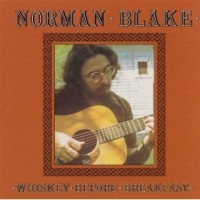Norman Blake
|
[By way of an RCA Victor Living Stereo reissue on CD, Signor Scardanelli rails in his Motley at the sentimentality that clings to the analog black-disc. In the interest, therefore, of fair play, we offer for your reading pleasure The Abso!ute Sound’s Tamara Baker, one of the republic’s more personable philovinylites. Ed.] Tamara Baker [June 1998. Originally appeared in La Folia 1:2.] Norman BLAKE: Whiskey Before Breakfast Rounder LP 0063 “Norman Blake?” you say, scratching your head because this guy’s name is about as familiar to you as the finer points of quantum theory. “Who the heck is he?” Oh, Norman?… he’s nobody, really. Nobody über-famous, like Madonna; or even semi-famous, like The Band. But this nobody is one of the better instrumentalists ever to do session work, in Nashville and elsewhere. And his solo albums – of which Whiskey… happens to be one of the earliest, a mid-70’s product – are starkly beautiful gems that glitter with the richness of deceptive simplicity. His genre? That’s a little difficult to say. Now you, upon reading the above paragraph, may have noted I mentioned his work as a Nashville session man, and immediately plugged in the word “country.” And you would be right and wrong at the same time. Yes, he has played on many mainstream country albums – and a little variant masterpiece called Nashville Skyline, by a guy whose birth name was Robert Zimmerman. But his first love and true calling has been the old forms of country, the way it was back before Nashville and Bluegrass and a whole bunch of other, more profitable musics deposed the authentic country from its rightful place in the souls of the country folk. It has even lost the right to be called “country”: the preferred appellation for it is now “Old-Time Music.” It’s what John Hartford plays, on his own masterpiece LP Aereo Plain and elsewhere. It’s what the enthusiasts listen to when they go to the hills of Galax, Virginia, to hear the music done the ways that the old-timers did and do it – and to hear the better of the new-timers make it their own in ways that Nashville will care to co-opt. It’s what Doc Watson plays, that man who is all too often taken for a strict bluegrasser, to the profound irritation of the Bluegrass Nazis out there: For political correctness is as nothing before the strictures of a truly hard-core Bluegrass nut. And it’s what Norman Blake plays. And this album is perhaps his best work, done before he felt he had to become, like The Father of Bluegrass Bill Monroe, his own genre, complete with rules and consistencies and parameters to obey – back when he could still show up on stage wearing a polyester shirt and sneakers, instead of his current semi-hokey Grand-Ole-Opry cap and overalls. He plays the old tunes, like “Under the Double Eagle,” as if he wrote them. His guitar has a loping, blue-jean feel to it, heavy on the bass thumb that anchors the tune. It flows so effortlessly from him, that it sounds quite simple, until you try to play it and you find your fingers flying all over the place as you try to keep track of the bass and the melody and still keep that same effortless feel. Did I mention he can sing? Not in the polished sense of a Placido Domingo, but in the sense most appropriate to his tunes: with a reedy, high-pitched tenor that gets across the achingly lonesome flavor of “Church Street Blues” with oceans of subtlety impossible to most operatic tenors, as indeed “Nessun Dorma” would be impossible for him. He often has accompaniment – usually another guitar, or his wife Nancy on cello or perhaps a small parlor guitar – but it melds so seamlessly with his sound that it’s often difficult to tell where they end and he begins: Just one giant, sonic entity. And he’s someone you need to hear for yourself. Enjoy.
[More Tamara Baker, Vol. 1, No. 2]
[Previous Article:
Archeological Dig]
[Next Article:
New Label, Old Treasures]
|
